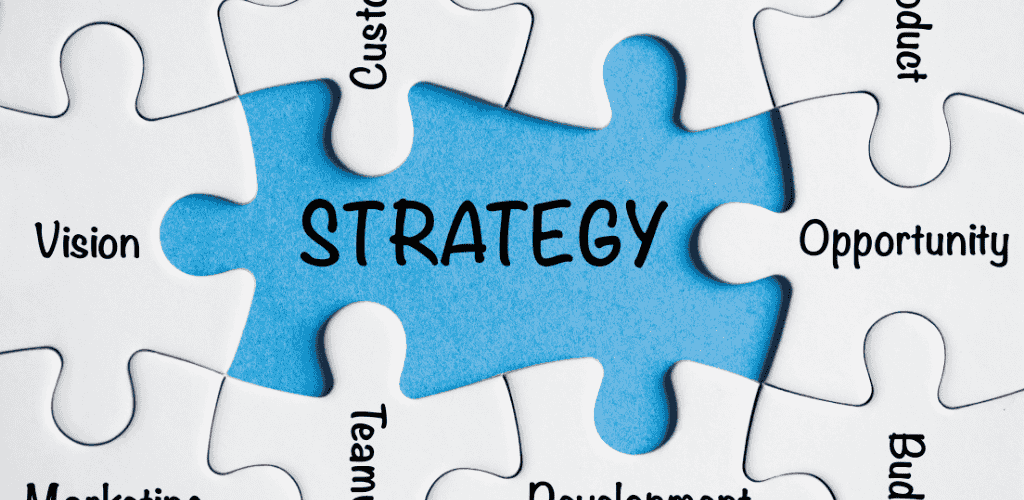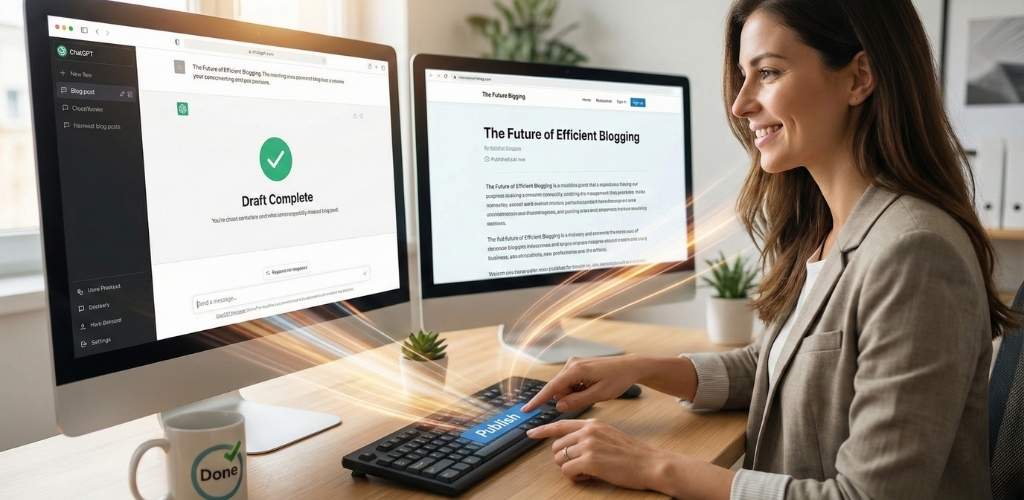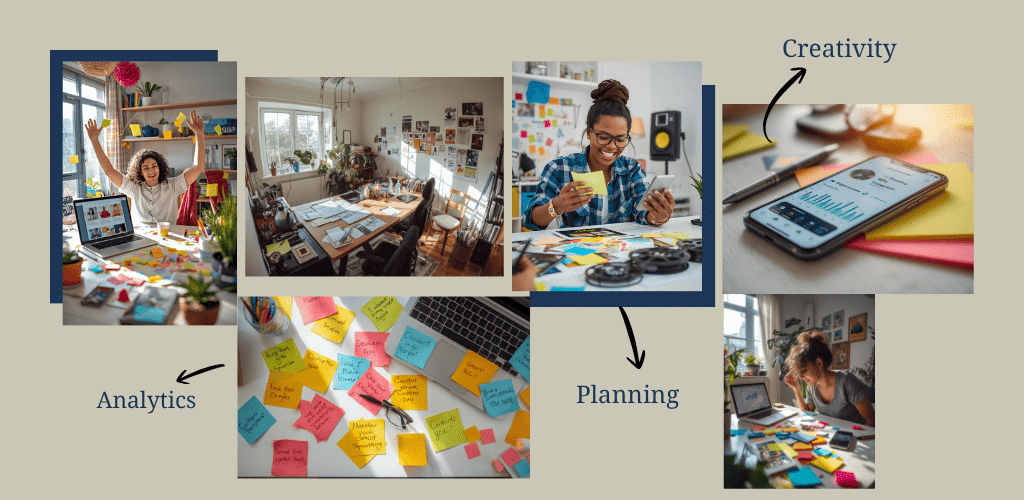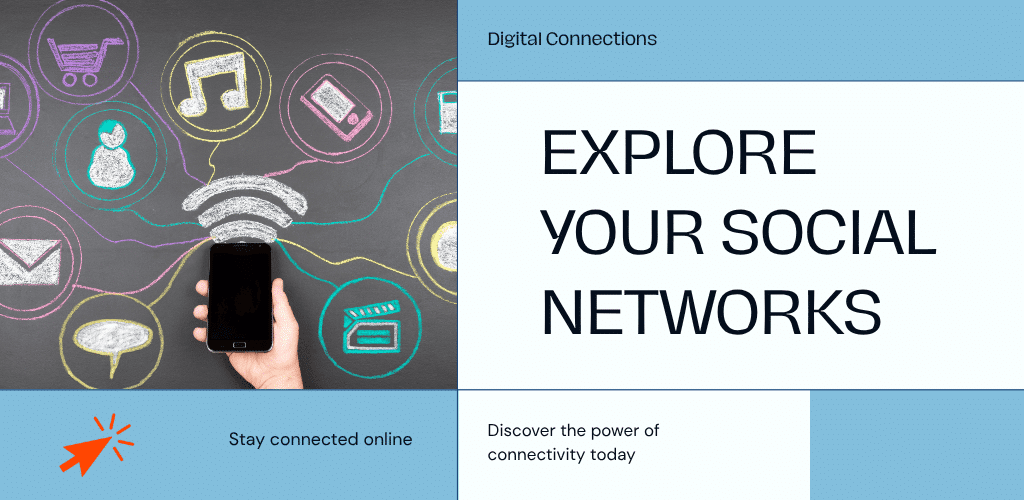Have you ever stumbled upon a blog that captivated you for hours, leaving you wondering, “How do they do it?” Whether you’re scrolling through stunning travel photos, devouring mouthwatering recipes, or absorbing expert advice, blogs have become an integral part of our online experience. But what exactly is blogging, and how does it work?
Blogging is more than just an online journal—it’s a powerful platform for sharing ideas, building communities, and even generating income. From personal musings to professional insights, blogs have evolved to serve diverse purposes in our digital landscape. If you’ve ever considered starting your own blog or simply wanted to understand the magic behind your favorite online destinations, you’re in the right place.
In this post, we’ll dive deep into the world of blogging, exploring everything from understanding the basics to unlocking the keys to blogging success. You’ll discover the various types of blogs, learn how to start your own, uncover the benefits of blogging, and even explore monetization strategies. Whether you’re a curious reader or an aspiring blogger, get ready to embark on an exciting journey through the blogosphere!
Table of Contents
Understanding Blogging
A. Definition and evolution of blogs
Blogging has come a long way since its inception. You might be wondering, “What exactly is a blog?” A blog is essentially an updated website that maintains ongoing chronicles of content. The term “blog” evolved from “weblog,” and it typically features diary-like entries and links to external articles, arranged in reverse chronological order.
As you delve into the world of blogging, you’ll find that blogs can cover a wide array of topics, including:
- Personal experiences
- Opinions
- Specialized subjects (e.g., technology, sports, web design)
B. Key elements of successful blogs
To create a successful blog, you should focus on these essential elements:
- Regular content updates
- Engaging and high-quality articles
- Comment sections for reader interaction
- Blogrolls linking to related sites
As a blogger, your primary responsibility is to produce and update content that keeps your readers engaged. Remember, content is central to your blog’s success and should be tailored to your blog’s focus.
| Element | Purpose |
|---|---|
| Main content area | Showcase articles in chronological order |
| Comment section | Facilitate reader interaction |
| Blogroll | Link to related sites and build community |
C. Difference between blogs and traditional websites
You might be wondering how blogs differ from traditional websites. Here’s a breakdown of the key distinctions:
- Update frequency: Blogs are updated more regularly than traditional websites.
- Content format: Blog posts are often more informal and conversational.
- Interaction: Blogs encourage reader engagement through comments and discussions.
- Chronological order: Blog posts are typically displayed in reverse chronological order.
While all blogs are websites, not all websites are blogs. As you create your blog, you’ll find that it’s typically managed by a single person (or a small team) and features frequent updates.
Now that you understand the fundamentals of blogging, you might be curious about the various types of blogs out there. In the next section, “Types of Blogs,” we’ll explore the diverse categories of blogs and how they cater to different interests and audiences.
Types of Blogs

Now that we’ve covered the basics of understanding blogging, let’s explore the various types of blogs you can create. Knowing these different categories will help you find your niche and start your blogging journey with clarity.
A. Personal blogs
Personal blogs are where many bloggers begin their journey. These platforms allow you to share your thoughts, experiences, and daily life with your audience. You can write about anything that interests you, from your hobbies to your personal growth.
B. Niche blogs
Niche blogs focus on specific topics or industries. By narrowing your focus, you can establish yourself as an expert in your chosen field. Some popular niche blog categories include:
- Food
- Travel
- Health and Fitness
- Fashion and beauty
- Personal finance
C. Multimedia blogs
These blogs go beyond text, incorporating various media types to engage your audience. You might include:
- Photography
- Videos
- Podcasts
- Infographics
D. News blogs
News blogs keep readers informed about current events, often focusing on specific industries or topics. You’ll need to stay up-to-date with the latest developments in your chosen area to succeed in this category.
E. Company blogs
Businesses use company blogs to showcase their expertise, add value for customers, and drive organic traffic. These blogs often focus on industry trends, product updates, and company news.
F. Affiliate blogs
Affiliate blogs monetize content through product recommendations and links. You’ll earn commissions when readers make purchases through your affiliate links.
G. Reverse blogs
Reverse blogs, while less common, allow readers to contribute content. This can create a sense of community and provide diverse perspectives on your chosen topics.
| Blog Type | Main Focus | Monetization Potential |
|---|---|---|
| Personal | Self-expression | Low to Medium |
| Niche | Specific topics | Medium to High |
| Multimedia | Various media types | Medium to High |
| News | Current events | Medium |
| Company | Business expertise | Indirect (leads/sales) |
| Affiliate | Product recommendations | High |
| Reverse | Community contributions | Low to Medium |
With this understanding of different blog types, you’re better equipped to choose the category that aligns with your interests and goals. Remember, successful blogging stems from selecting a topic you’re passionate about, as your enthusiasm will engage readers and potentially lead to monetization opportunities.
As we move forward, we’ll explore the next crucial step in your blogging journey: starting a blog. You’ll learn how to set up your platform, choose a domain name, and begin creating content that resonates with your audience.
Starting a Blog
Now that we’ve explored the various types of blogs, let’s dive into the practical steps of starting your own blog.
A. Essential elements for creating a blog
To kickstart your blogging journey, you’ll need to focus on a few key elements:
- A clear niche or topic
- A memorable blog name
- Reliable web hosting
- User-friendly blogging platform
- Engaging content
- Appealing design
B. Choosing a domain name and web hosting
Your domain name is your blog’s online address, so choose wisely. It should be:
- Descriptive of your blog’s topic
- Easy to remember and spell
- Unique to stand out
For web hosting, consider reliable providers like BlueHost, which offers seamless integration with popular blogging platforms.
C. Selecting a blogging platform
WordPress is a popular choice for many bloggers due to its flexibility and extensive features. However, other options include:
| Platform | Best for |
|---|---|
| Wix | Beginners seeking user-friendly design |
| Blogger | Those wanting a simple, free option |
| WordPress | Versatility and customization |
D. Importance of content writing skills
While you don’t need to be a professional writer, honing your content creation skills is crucial. Focus on:
- Engaging, original material
- Regular posting schedule
- SEO optimization
- Proper grammar and spelling
Remember, passion for your topic often trumps perfect prose when connecting with your audience.
E. Choosing a theme or template
Your blog’s appearance sets the tone for your readers. When selecting a theme:
- Choose one that aligns with your niche
- Ensure it’s mobile-responsive
- Look for customization options
- Consider load time and performance
With these elements in place, you’re ready to embark on your blogging journey. As you move forward, you’ll discover the numerous benefits that blogging can bring to your personal and professional life. From honing your writing skills to potentially generating income, the advantages of blogging are numerous and varied.
Benefits of Blogging

Now that we’ve covered how to start a blog, let’s explore the numerous benefits that blogging can bring to your personal and professional life.
A. Personal branding opportunities
Blogging offers you a powerful platform to establish and enhance your personal brand. By consistently sharing your expertise and insights, you can:
- Showcase your knowledge and skills
- Build authority in your niche
- Manage your online identity
- Attract potential employers or clients
Your blog serves as a digital portfolio, demonstrating your expertise and passion to a global audience. This visibility can lead to exciting opportunities such as speaking engagements, book deals, and even job offers in your field of interest.
B. Income generation potential
While we’ll dive deeper into monetization strategies in the next section, it’s important to highlight the income potential that blogging offers. You can transform your passion into profit through various means:
- Creating and selling information products
- Attracting advertising revenue
- Developing affiliate marketing partnerships
| Income Stream | Description | Potential |
|---|---|---|
| Info Products | Courses, ebooks, workshops | High |
| Advertising | Display ads, sponsored content | Medium |
| Affiliate Marketing | Promoting others’ products | Variable |
By consistently producing valuable content, you’ll build an engaged audience that can support your monetization efforts.
C. Building an online community
One of the most rewarding aspects of blogging is the ability to connect with like-minded individuals from around the world. Your blog can become a hub for:
- Sharing ideas and fostering discussions
- Networking with peers and industry professionals
- Receiving immediate feedback on your content
- Creating a loyal fan base
This community not only provides support and inspiration but can also lead to collaborative opportunities and professional growth. By engaging with your readers, you’ll gain valuable insights that can help you refine your content and expand your knowledge.
As you cultivate your online presence through blogging, you’ll find that the benefits extend far beyond just sharing your thoughts. Your blog becomes a powerful tool for personal development, career advancement, and connecting with others who share your interests. With these advantages in mind, next, we’ll explore the various monetization strategies that can help you turn your blogging passion into a sustainable income stream.
Monetization Strategies

Now that we’ve explored the benefits of blogging, let’s dive into the exciting world of monetization strategies. You’ve put in the effort to create valuable content, and it’s time to turn your passion into profit.
A. Traffic-based income
You can leverage your blog’s traffic to generate income through various methods:
- Display advertising: Utilize platforms like Google AdSense to place ads on your blog.
- Pay-per-click (PPC): Earn revenue when visitors click on ads displayed on your site.
- Cost per mille (CPM): Get paid based on the number of ad impressions your blog receives.
As your traffic grows, so does your potential for ad revenue. Remember, the key is to balance monetization with user experience.
B. Affiliate marketing
Affiliate marketing is a powerful way to monetize your blog:
- Promote products or services relevant to your niche
- Earn commissions on sales generated through your unique referral links
- Choose trustworthy affiliate partnerships that align with your audience’s interests
| Popular Affiliate Programs | Commission Rates | Niche Suitability |
|---|---|---|
| Amazon Associates | 1-10% | Various |
| CJ Affiliate | Varies | Multiple niches |
| Upwork Affiliates | Up to $250/referral | Freelancing |
Remember to disclose your affiliate relationships to maintain transparency with your readers.
C. Sponsored posts
You can collaborate with brands to create sponsored content:
- Write posts featuring products or services
- Receive compensation for your promotional efforts
- Ensure sponsored content aligns with your blog’s niche and values
Platforms like Blog Meets Brand and Upfluence can help you connect with potential sponsors. As your blog grows, you may find more lucrative sponsorship opportunities coming your way.
D. Profitable blogging niches
While any niche can be monetized, some tend to be more lucrative:
- Personal finance
- Health and wellness
- Technology and gadgets
- Travel
- Self-improvement
Choose a niche that not only has profit potential but also aligns with your passions and expertise. This will help you create authentic, engaging content that resonates with your audience.
With these monetization strategies in mind, you’re well on your way to turning your blog into a profitable venture. In the next section, we’ll explore the keys to blogging success, which will help you implement these strategies effectively and sustainably.
Keys to Blogging Success

Now that we’ve explored monetization strategies, let’s dive into the keys to blogging success. These essential elements will help you build a thriving blog that not only attracts readers but also keeps them coming back for more.
Focusing on quality content
You must prioritize creating high-quality, valuable content for your readers. This means:
- Crafting engaging headlines to capture attention
- Using the Problem-Agitate-Solution (PAS) formula for compelling introductions
- Writing detailed, well-researched posts (aim for over 2,000 words)
- Incorporating expert quotes and examples to add credibility
Remember, your unique perspective is what sets you apart. Share your genuine passion and insights to create authentic, original content that resonates with your audience.
Maintaining consistency
Consistency is crucial for building and retaining your readership. You should:
- Post regularly, ideally 2-4 times per week
- Stick to your chosen niche and subject matter
- Use an editorial calendar to plan and schedule your posts
- Share your content consistently on social media platforms
Effective blog design
Your blog’s design plays a significant role in user experience. Ensure your blog is:
- User-friendly and aesthetically pleasing
- Easy to navigate with clear categories and popular posts sections
- Optimized for readability with concise writing and clear subheadings
- Enhanced with multimedia elements like images and videos
Engaging with readers
Building a community around your blog is essential. You can:
- Respond to comments and encourage discussions
- Participate in online communities related to your niche
- Build an email list to foster reader loyalty
- Collaborate with other bloggers for guest posts and interviews
Developing content writing skills
Continually improving your writing skills is key to long-term success. Focus on:
| Skill | How to Improve |
|---|---|
| SEO optimization | Learn and apply best practices for search engine visibility |
| Readability | Use bullet points, subheadings, and concise paragraphs |
| Research | Analyze competitors and gather feedback from peers |
| Adaptability | Stay updated with trending topics and search intent |
By implementing these strategies and consistently working on your craft, you’ll be well on your way to blogging success. Remember, building a successful blog takes time and persistence, so stay committed to your journey and continue learning and adapting along the way.
Blogging has evolved from personal online journals to powerful platforms for sharing knowledge, building brands, and even generating income. As you’ve learned, there are various types of blogs to explore, each catering to different audiences and purposes. Whether you’re looking to express yourself, establish expertise, or promote a business, starting a blog can be an exciting and rewarding endeavor.
Remember, success in blogging comes from consistent, high-quality content, effective engagement with your audience, and a clear understanding of your niche. As you embark on your blogging journey, focus on developing your writing skills, selecting the right tools and platforms, and implementing monetization strategies that align with your goals. With dedication and the right approach, you can create a thriving blog that not only satisfies your creative aspirations but also opens doors to new opportunities and connections in the digital world.








